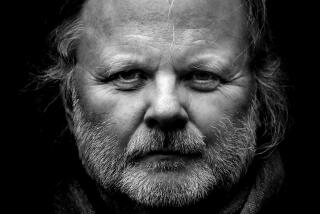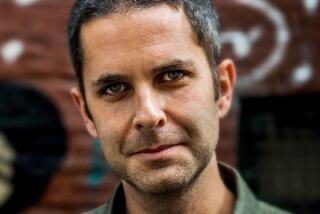THE GREAT PRETENDER <i> by James Atlas (Atheneum: $14.95; 277 pp.) </i>
- Share via
“Find that spontaneous well of emotion, and use it,” the high school teacher instructs her class of damp great poets in a high school in Evanston, Ill.; and Ben Janis, the hero of James Atlas’ first novel, wanting to be the greatest poet of them all, dowses for this well in a somewhat comfy suburban terrain. He’s horny, he’s adolescent, he’s Jewish, he is burdened--this is a switch--by nice parents, he is avid and scared. “The Great Pretender,” written in the form of an autobiographical memoir, describes the storm and struggle of young Ben in the environs of Chicago, at Harvard, and in England at Oxford, with excursions to such further outposts of the life of art as San Francisco.
As a sometimes victim of autobiographical explanation, I hesitate to indicate the similarities between the life of James Atlas, who I’ve never met, and Ben Janis, who I now know pretty well. I hesitate, but here I go. Atlas is well known as a literary journalist, author of a highly regarded biography of the poet Delmore Schwartz. In this book, there is a version of a manic poet--Boston aristocrat, Harvard lecturer--which evokes the shade of Robert Lowell. The names of current literary celebrities are sprinkled throughout the text. The book has entertainment value as gossip, besides offering snappish turns. It often reads more like a new-journalistic essay than a novel, exploring the comedy of academic life (like David Lodge’s brilliant novel, “Small World”) along with the social history of campus sexuality in the ‘60s.
Ben Janis, boy artist in Evanston, realizes his work needs something more; therefore, “I got out my pastels and colored the spaces around the poem.” He does literary criticism and art history at a strictly specialized summer camp, “an intellectual boot camp.” There are funny evocations of Milton Cross announcing opera, a distracted mother, an excruciatingly solemn and decent father who never quit being decent and solemn. Ben seems to realize he is like his father and puts himself into a major dilemma: How can he be smart, sexy, and go ape, as required by his reading of modern literature, while also never being less than responsible?
Drugs, drink, virginity and its opposite, hard ‘60s duty, provide a nice repertory of snares. “No one ever said the revolution would be fun,” he thinks. The sex scenes recall Portnoy, but Atlas manages a note of his own wry which will enable the reader to survive them. When someone says, “Do your own thing,” Ben wonders if it’s OK if browsing in book shops is his thing. When he backs out of a threesome, two girls and himself, he issues a considerate apology to Henry Miller for his timidity. The son credits his connections with his family, and unlike Portnoy’s wild resentment and vengeance, there is a convincing tenderness in the family portraits.
The tradition of the novel of growing up, breaking with tradition, understanding the world, conquering the great city--Dick Whittington come to London, Rastignac to Paris, Augie March in Chicago--always risks self-importance in the telling. “The Great Pretender” is the portrait of the artist as a very solemn young man. James Atlas, smiling indulgently at the reflection in the mirror, stands enough aside to allow a little room in the glass for the ardent young women, the other greedy young men, the distracted older generation on his path. His comic economy provides pleasure nearly throughout. When a smug Harvard undergraduate cites Neitzsche--”I mean, you really feel the power of his nihilism; everything must go”--another student asks, “Can I keep my underwear?” When a Harvard prof accuses a creative writing student: “You’ve been reading Hardy,” the boy answers, “Not really. I mean, no more than usual.”
Such are the joys of overweening literary ambition. The would-be from Evanston stands in an English church and asks himself: “Was death any different if you got to spend eternity in one of these granite tombs?”
More to Read
Sign up for our Book Club newsletter
Get the latest news, events and more from the Los Angeles Times Book Club, and help us get L.A. reading and talking.
You may occasionally receive promotional content from the Los Angeles Times.










